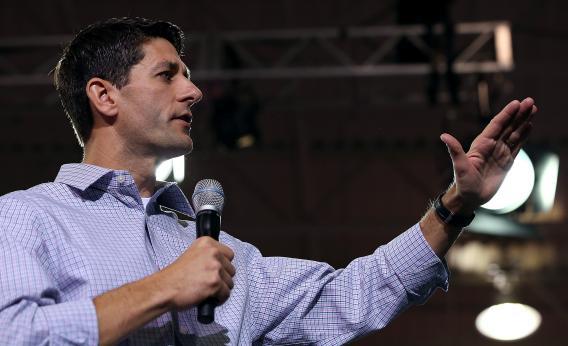Introducing his running mate against the backdrop of the USS Wisconsin on Saturday, Mitt Romney flubbed his easiest line. “Join me in welcoming the next president of the United States,” he declared. There is no way to avoid reading this as a Freudian slip. Romney’s chief problem as a candidate has been his substantive vacuity, his failure to stand for anything beyond flexibility itself. In choosing Paul Ryan, he opted to outsource the content of his campaign to his opposite: a principled, conservative idea man. Ryan is now the head of the Republican ticket, Romney the body.
Given the options he had left himself, this was probably the best choice Romney could make. Ryan stands for a clear proposition—the radical scaling back of the federal government’s social commitments—and through his pick, Romney now represents that as well. Usually, a vice presidential candidate scrambles to fall into line with the top of the ticket. In this case, it is Romney who will, not for the first time, have to adjust his views. Instead of attacking President Obama for cutting Medicare, Romney must now charge him with not cutting it enough—though he may try, absurdly, to do both.
Curiously, both conservatives and liberals profess to be pleased with the choice, the former because Ryan represents their beliefs and the latter because he offers clear positions they can challenge. Though both cannot be right about the political impact of the selection, the campaign itself will benefit from Romney’s choice. Ryan’s presence on the ticket makes this a better and more interesting election. It forces the debate the country needs to have about entitlement spending and ensures that the remaining months will be more than an argument about whose negative ads are more disgusting.
It is hard to see it, however, as improving Republican chances. Until now, Romney has been a poor candidate running a clumsy campaign and pointed toward losing a winnable race. Ryan changes that narrative, but only by reframing the election the way Obama’s team wishes to, as a choice between two visions of the social contract as opposed to a referendum on Obama’s economic performance. Instead of teasing out the implications of Romney’s tax cuts, Obama can now directly challenge Ryan’s stated positions in favor of privatizing Social Security and turning Medicare into a voucher program. Florida, a must-win state for Romney, just moved closer to Obama’s column.
A valid critique of the plan Ryan developed as chairman of the House budget committee is that while it may be a useful document to start a conversation, it is utterly unrealistic as a matter of policy. The original version would reduce federal “discretionary” spending to 3 percent of GDP by 2050—far less than the U.S. now spends on defense alone. This is a preposterous target, a symptom of the Republican refusal to acknowledge that federal government has legitimate, vital functions and that fiscal balance can’t be attained without higher taxes.
Another fair criticism for Ryan, somewhat at odds with the first, is that while he may be a devotee of Ayn Rand, he has voted more like a Republican hack than a revolutionary. In Congress, he has sought federal funds for his Wisconsin district and supported the most egregious Bush spending programs, such as the Medicare prescription drug plan. While positioning himself as a deficit hawk, Ryan failed to embrace the report of the Simpson-Bowles commission, on which he sat.
Yet Ryan is neither the heartless ideologue nor the humbug liberal critics have made him out to be. He is, rather, a conviction politician who has moved his party far more than it has moved him. Getting the House to pass his budget this year—thus putting the GOP on record in favor of ending Medicare as an entitlement—was a stunning accomplishment. It puts an end to the Republican attempt to have it both ways, calling for less government in theory while voting for more in practice. It puts the onus on Democrats to say how else they would restrain a program that is growing to consume the entire federal budget.
In their efforts to portray him as simply a factotum for the rich, Ryan’s opponents frequently ignore what he has to say. For instance, the Ryan budget was widely criticized for finding savings from the elimination of tax deductions without naming any to eliminate. But when I questioned Ryan about this at a breakfast with journalists a few months ago, his answer was both clear and sensible: He would means-test all tax deductions, including the big ones for mortgage-interest and charitable contributions. This is a sound way to extract more taxes from the wealthy without raising marginal rates. If he didn’t spell it out in his budget outline, it is because he has yet to develop a consensus around the idea inside the Republican caucus.
In the event of a Republican victory, Ryan would be as dominant a figure on economic policy as Dick Cheney was on foreign policy under George W. Bush. He understands the hard choices ahead and has a coherent view of how to make them. His selection represents a big step in the direction of conservative honesty—and probably, for that reason, toward Republican defeat.
A different version of this article appears in the Financial Times.
